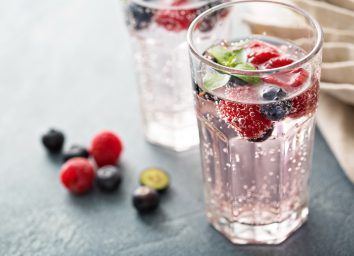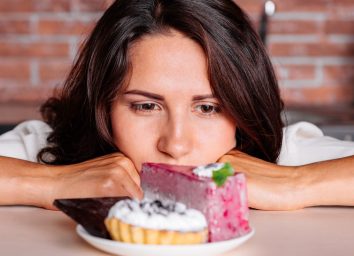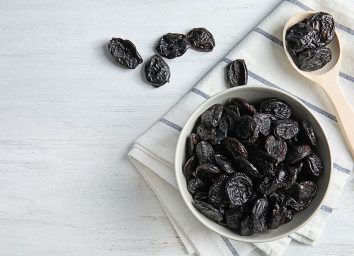The 7 Best Drinks To Stop Sugar Cravings
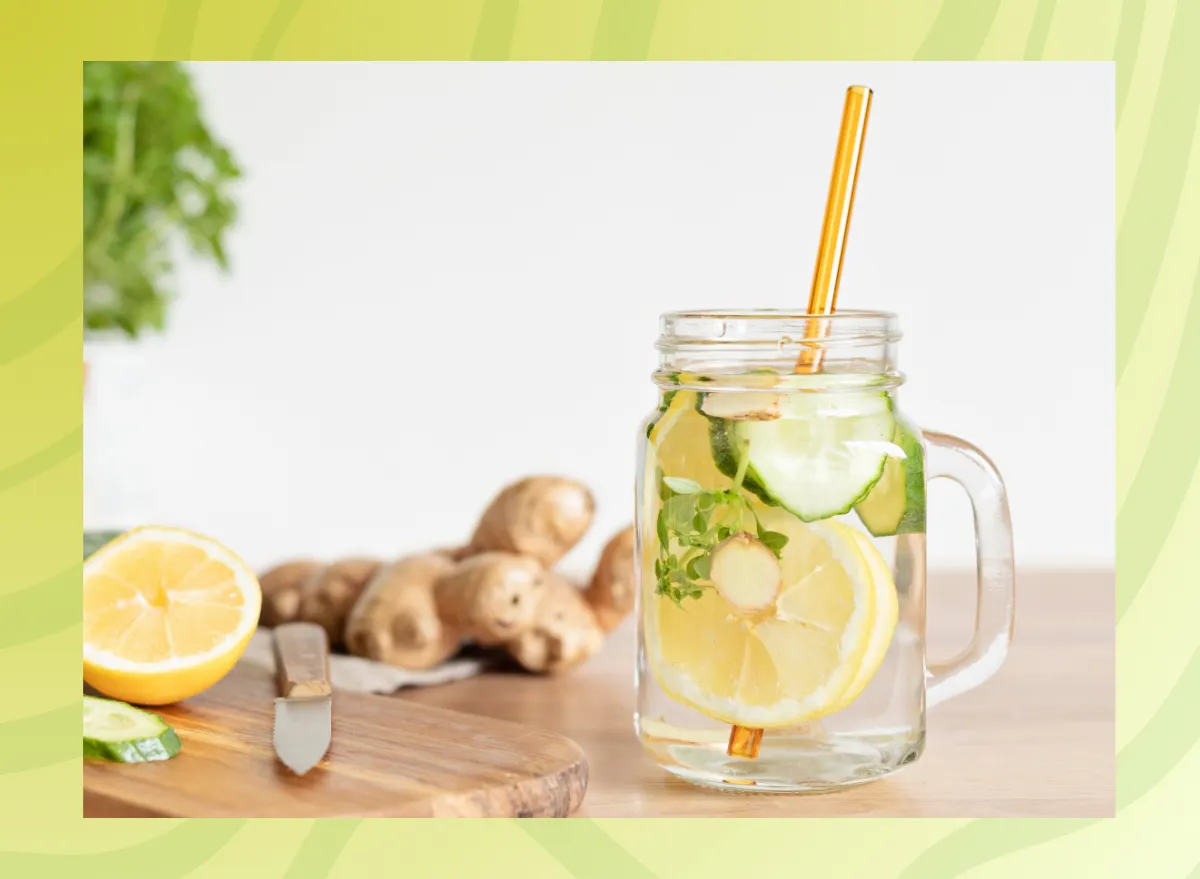
Who among us hasn't felt the siren call of a sugary treat beckoning us with its irresistible charm? Sugar cravings are a universal experience, threading through the tapestry of our days with the promise of a sweet escape. Whether it's the allure of that chocolate bar after a long day or the anticipation of a homemade cookie, these cravings are little whispers of joy in our routines.
But everything comes with its pros and cons. Eating too many sugary treats may satisfy a sweet tooth; however, doing so can contribute to a myriad of health concerns when consumed in excess, including an increased risk of dental cavities, weight gain, and heart health concerns.
A wide variety of factors can impact sugar cravings, including psychological triggers, hormonal fluctuations, and dietary choices. While your beverage choices are unlikely to make or break your desire for something sweet, choosing some drinks over others may help you combat your sugar craving naturally in certain situations.
If you are finding yourself having sugar cravings, here are the seven drinks you may want to consider to help tame your hankering.
Lower-sugar sodas
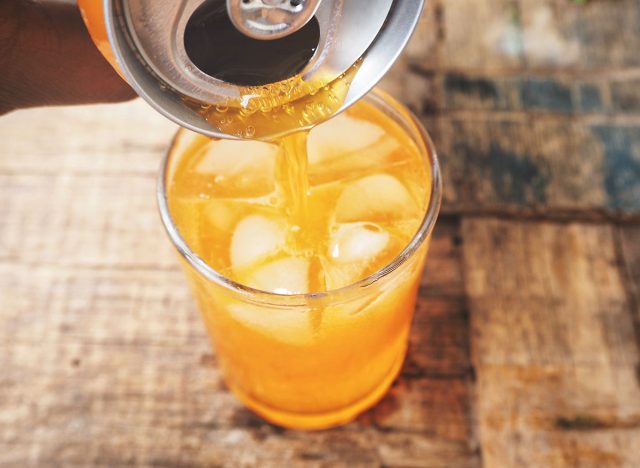
Lower-sugar sodas can be a tactical choice for those looking to manage or reduce their sugar cravings. These beverages typically contain less sugar than their full-sugar counterparts, potentially leading to reduced sugar intake overall. When consumed in moderation, they can satisfy the desire for a sweet taste without delivering the full load of sugar found in regular sodas. This can help in gradually diminishing the body's craving for sweets, acting as a stepping stone towards adopting a healthier diet with lower sugar content overall.
Unlike diet sodas, which may use artificial sweeteners for their sweet taste, some lower-sugar sodas combine smaller amounts of sugar with natural, non-nutritive sweeteners, like stevia leaf, to provide the flavor we know and love.
Watermelon juice
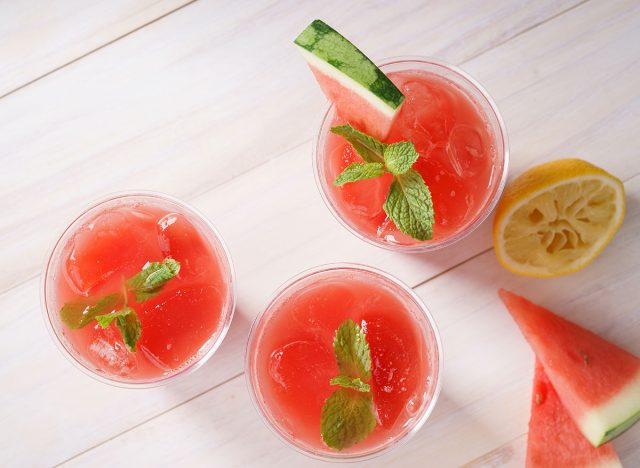
If fruit juice is what you are craving, reaching for watermelon juice may quench your thirst while helping you manage your sugar craving. One 8-ounce glass of watermelon juice (made with just the juice of watermelon) provides around 70 calories and zero grams of added sugar (note it does contain natural sugars).
But one of the main reasons this drink made our list is because it is a natural source of magnesium. Magnesium deficiency can play a significant role in driving sugar cravings, as this mineral is essential for glucose metabolism. Without sufficient magnesium, the body can struggle to regulate blood sugar levels, leading to an increased desire for sweets as a quick energy source. Each 8-ounce glass provides 24 grams of this important mineral.
Water
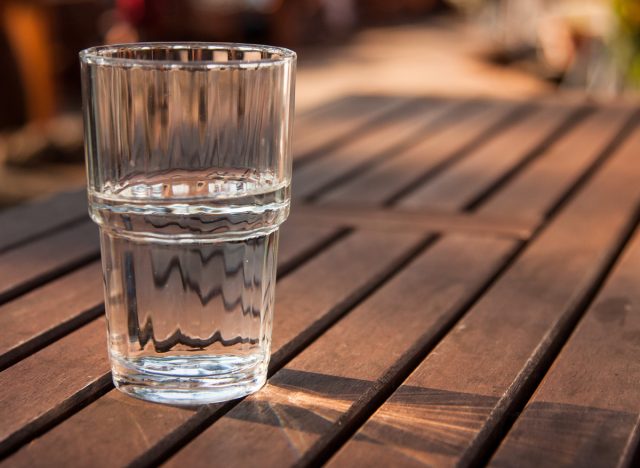
Yes plain old H2O may help you curb your sugar craving naturally and conveniently. Why? Some people think they are hungry when they are actually thirsty. So, leaning on water when a sugar craving hits may allow you to tame your thirst, and in turn, manage your sugar craving. Because maybe you didn't need sweets after all and your body was just asking for a sip of water!
Matcha
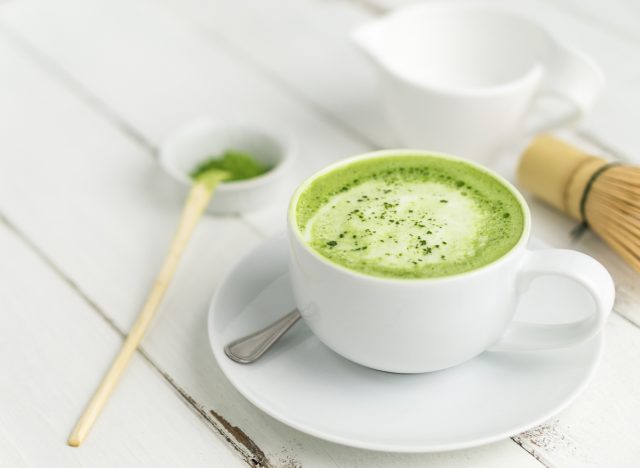
Matcha, a finely ground powder made from specially grown and processed green tea leaves, has soared in popularity for its unique taste, health benefits, and cultural significance in tea ceremonies. Its ability to help manage sugar cravings stems from its high content of L-theanine, an amino acid that promotes relaxation and well-being, while reducing stress and anxiety, which are common triggers for sugar cravings.
If you aren't a matcha fan, traditional green tea would work similarly.
Kombucha
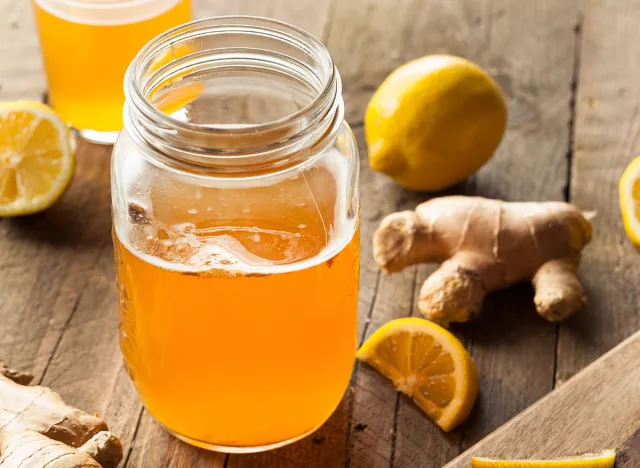
Kombucha is a fermented tea known for its tangy taste and numerous health benefits, particularly its potential to aid in managing blood sugar levels. This beneficial effect can be attributed to the presence of acetic acid, produced during the fermentation process. Acetic acid is believed to improve insulin sensitivity, allowing the body to utilize glucose more effectively and potentially lowering blood sugar levels. Additionally, kombucha contains probiotics, which contribute to a healthier gut microbiome—a factor linked to improved glucose metabolism and certain food cravings and desires.
Data from Georgetown University showed that drinking certain kombuchas with a diverse range of probiotic bacteria may reduce blood sugars among people with type 2 diabetes. When choosing your kombucha, be sure to opt for one with live bacteria that come from different strains, and that contains acetic acid.
Apple Cider Vinegar Shots
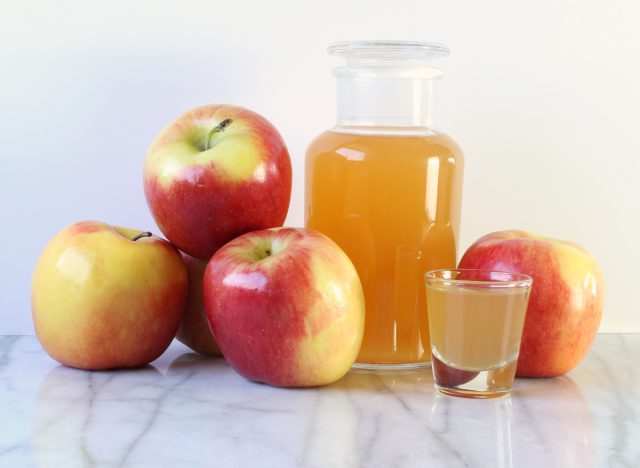
Apple cider vinegar (ACV) shots are small servings of concentrated apple cider vinegar, often mixed with water and sometimes sweetened or flavored for palatability. These shots are reputed to aid in managing sugar cravings by helping stabilize blood sugar levels among certain populations. The acetic acid found in ACV is thought to slow down the digestion of carbohydrates, leading to a more gradual release of glucose into the bloodstream. This process can help mitigate spikes in blood sugar that often lead to increased sugar cravings, making ACV shots a popular choice for those looking to maintain a balanced diet and manage their sugar intake.
Infused Water
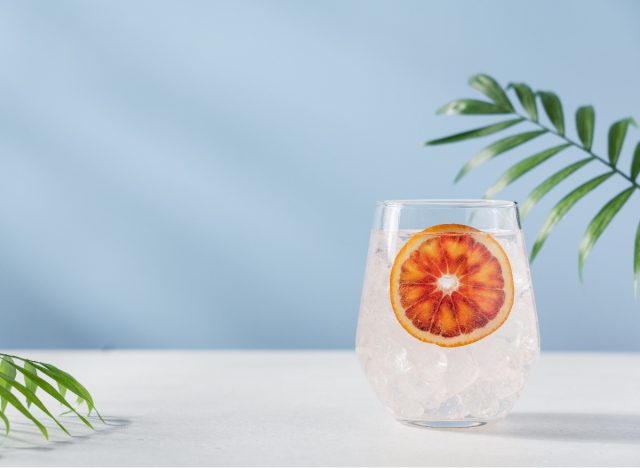
Infused water is a refreshing way to stay hydrated by infusing fruits, vegetables, and herbs in cold water. This process not only enhances the flavor of water, making it more appealing to drink but also incorporates the subtle essences and nutrients of the infusion ingredients. When it comes to managing sugar cravings, infused water can be a powerful ally. The natural sweetness from fruits like berries, watermelon, or citrus can satisfy your sweet tooth without the need for added sugars, helping to curb cravings in a healthy and hydrating manner.
- Source: Meyer, F., Schulze Zur Wiesche, E., Amaechi, B. T., Limeback, H., & Enax, J. (2024). Caries Etiology and Preventive Measures. European journal of dentistry, 10.1055/s-0043-1777051. Advance online publication. https://doi.org/10.1055/s-0043-1777051
- Source: Petchoo, J., Kongnun, B., Mahmeen, S., Tohsan, W., & Yooying, R. (2024). Association between added sugar consumption in foods and beverages and body mass index among adolescents in university southern Thailand: a cross-sectional study. Roczniki Panstwowego Zakladu Higieny, 75(1), 5–11. https://doi.org/10.32394/rpzh.2024.0293
- Source: Feingold, K. R. (2024). The Effect of Diet on Cardiovascular Disease and Lipid and Lipoprotein Levels. In K. R. Feingold (Eds.) et. al., Endotext. MDText.com, Inc.
- Source: FoodData Central. (n.d.). https://fdc.nal.usda.gov/fdc-app.html#/food-details/2344827/nutrients
- Source: Williams, J. L., Everett, J. M., D'Cunha, N. M., Sergi, D., Georgousopoulou, E. N., Keegan, R. J., McKune, A. J., Mellor, D. D., Anstice, N., & Naumovski, N. (2020). The Effects of Green Tea Amino Acid L-Theanine Consumption on the Ability to Manage Stress and Anxiety Levels: a Systematic Review. Plant foods for human nutrition (Dordrecht, Netherlands), 75(1), 12–23. https://doi.org/10.1007/s11130-019-00771-5
- Source: Valdes, D. S., So, D., Gill, P. A., & Kellow, N. J. (2021). Effect of Dietary Acetic Acid Supplementation on Plasma Glucose, Lipid Profiles, and Body Mass Index in Human Adults: A Systematic Review and Meta-analysis. Journal of the Academy of Nutrition and Dietetics, 121(5), 895–914. https://doi.org/10.1016/j.jand.2020.12.002
- Source: Alcock, J., Maley, C. C., & Aktipis, C. A. (2014). Is eating behavior manipulated by the gastrointestinal microbiota? Evolutionary pressures and potential mechanisms. BioEssays : news and reviews in molecular, cellular and developmental biology, 36(10), 940–949. https://doi.org/10.1002/bies.201400071
- Source: Mendelson, C., Sparkes, S., Merenstein, D. J., Christensen, C., Sharma, V., Desale, S., Auchtung, J. M., Kok, C. R., Hallen-Adams, H. E., & Hutkins, R. (2023). Kombucha tea as an anti-hyperglycemic agent in humans with diabetes - a randomized controlled pilot investigation. Frontiers in nutrition, 10, 1190248. https://doi.org/10.3389/fnut.2023.1190248
- Source: Gheflati, A., Bashiri, R., Ghadiri-Anari, A., Reza, J. Z., Kord, M. T., & Nadjarzadeh, A. (2019). The effect of apple vinegar consumption on glycemic indices, blood pressure, oxidative stress, and homocysteine in patients with type 2 diabetes and dyslipidemia: A randomized controlled clinical trial. Clinical nutrition ESPEN, 33, 132–138. https://doi.org/10.1016/j.clnesp.2019.06.006
- Source: Siddiqui, F. J., Assam, P. N., de Souza, N. N., Sultana, R., Dalan, R., & Chan, E. S. (2018). Diabetes Control: Is Vinegar a Promising Candidate to Help Achieve Targets?. Journal of evidence-based integrative medicine, 23, 2156587217753004. https://doi.org/10.1177/2156587217753004

